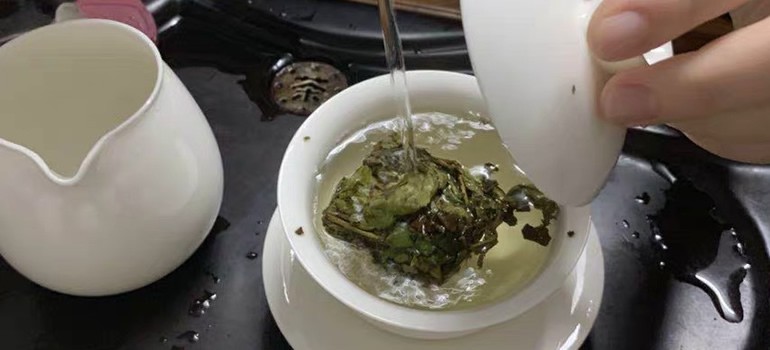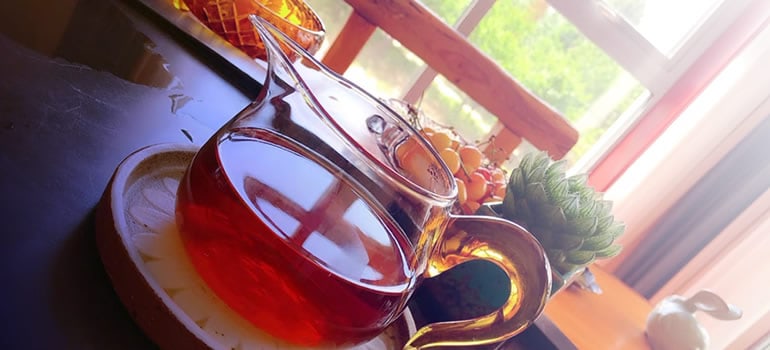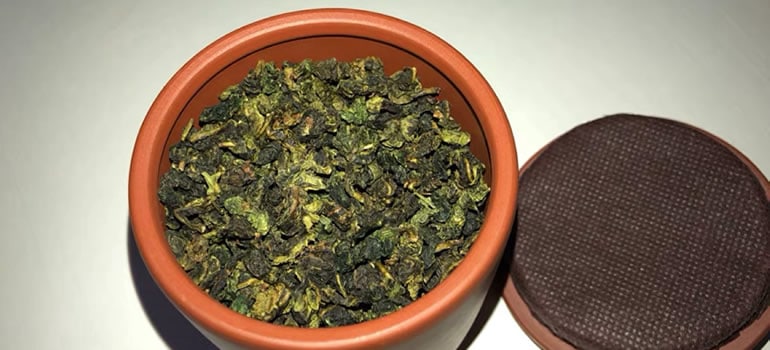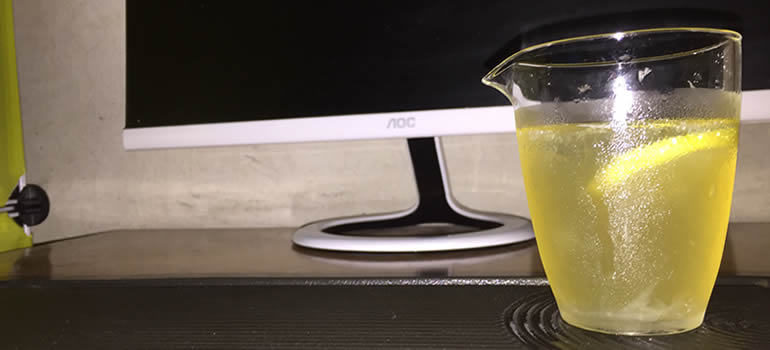Nearly a quarter of Americans suffer from insomnia.
Have you ever had trouble sleeping? It isn’t nice, is it? I’ve had my fair share of sleepless nights, and I know how bad it can be.
The reasons behind that can be stress, medications, lifestyle, sickness, and the list goes on.
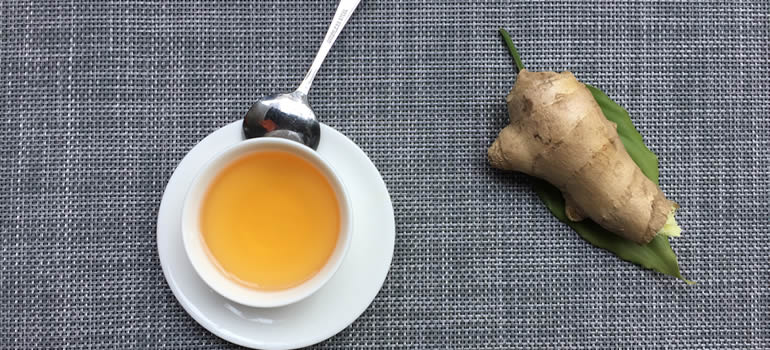
Another culprit can be what you usually drink right before bedtime. Certain teas can be incredibly soothing, but drink the wrong tea before calling it a day, and you may end up wide awake for several hours.
So can you drink ginger tea at night? Ginger tea contains no caffeine. This makes ginger tea suitable for drinking at night. Many users don’t report sleep disturbances after drinking ginger tea. However, drinking it at night may still cause some sleeping problems with certain people due to its metabolic boosting properties.
Ginger tea is a fresh ground ginger root that has been brewed and steeped in boiling water. It has several different health properties.
When to Drink Ginger Tea?
Once you know how it tastes, you cannot mistake ginger tea. Its specific pungent aroma and taste are making it the favorite cuppa tea of many.
Ginger is an herbal tea, which means it doesn’t contain any natural occurring caffeine. Ginger is a root, and its consumption is associated with numerous positive health benefits.
You can drink ginger tea at night; since there is no caffeine content found in it, it shouldn’t interfere with your sleep. Some people may, however, experience sleep disturbances after drinking ginger tea. (Spicy food has been known to interfere with sleep in some people.) So while some people may not experience troubles sleeping, others may not be so lucky.
However, it is best to drink ginger tea in the morning or at noon.
A cup of ginger tea stimulates digestion and bile secretion. This is making ginger tea a great way to jump-start your metabolism early in the morning.
However, make sure NOT to drink it on an empty stomach as this may irritate your stomach, especially if you have a more sensitive stomach. Because ginger tea can stimulate the metabolism, it is usually recommended as a morning or afternoon beverage.
You can benefit from the properties of ginger tea during every season of the year. During the summer ginger tea will be an excellent way to stay hydrated while during the winter it is a great immune-boosting beverage.
And adding some fresh lemon juice or turmeric to the ginger tea can complement and boost its cold-fighting properties even more.
Benefits of Drinking Ginger Tea
One of the biggest upsides to drinking ginger tea is that it can alleviate nausea, morning sickness, and other stomach issues. However, a word of caution, always speak to your doctor before taking ginger or any other food and beverage to alleviate health symptoms.
Ginger has been proven to reduce blood pressure. Lowering your blood pressure can be either good or bad, depending on your individual predispositions. It is claimed to be as good as some common medications.
Last but not least, ginger tea can improve blood circulation, and it is an excellent flu remedy. Ginger is an excellent source of vitamin C, which is a great way to strengthen our immune system.
Useful Information About Ginger Tea
A cup of ginger tea can be a good thing but drink too much, and you may be at risk of developing some side effects.
Ginger tea is not dangerous by itself; that would depend on how much of it you drink. This holds true for all things in life; everything should be taken in moderation.
After some extensive research, I found that the general consensus is not to consume more than four grams of ginger a day. Four grams are roughly equal to two tablespoons. This applies, of course to ginger from all food sources.
Consuming too much ginger may cause different mild side effects.
- It may cause an upset stomach, stomach aches, and diarrhea;
- It may interfere with your sleep causing insomnia;
- It has blood-thinning properties;
- It can cause lightheadedness due to lowering blood pressure;
- It has anti-inflammatory properties;
- It may cause heartburn, bloating, and gas; and
- It may potentially interfere with some drugs and medications.
What Teas to Avoid at Night?
If you want to enjoy a good night’s sleep, it is best to avoid all teas that have high amounts of caffeine content.
Caffeine has strong stimulating capabilities, which are making it so popular. Once ingested caffeine can take up to six hours for its effect to fully wear off. If you go to bed while there is still caffeine content in your body, you may have trouble getting to sleep.
Because of its high caffeine content, this strikes off coffee immediately. However, many might overlook the fact that tea can also be a source of caffeine.
These four popular kinds of tea contain caffeine:
Interestingly enough, there is something all of these kinds of teas have in common; they all are derived from the Camellia sinensis leaf. Many consider teas made from the Camellia sinensis leaf to be the “real” teas. One can argue that whether you have white or black tea in your cup, you are drinking the same kind of tea.
Of course, that is not entirely the case.
What separates these teas is the level of oxidation and preparation. And the level of oxidation influences the tea’s properties and caffeine content.
Is Decaf Tea Safe to Drink Before Bed?
Many of you might want to know how safe drinking decaf tea is before bedtime.
I have even seen some people stating that decaf green tea, for example, is great at night. I am not too sure about this, though.
Let me explain.
As we have seen all tea derived from the Camellia sinensis plant (Including green tea.) has naturally occurring caffeine content.
Decaf tea is processed in a unique way that removes the majority of its caffeine content. However, this doesn’t make decaf tea caffeine-free. Albeit small, decaf tea has caffeine content.
A decaf tea may be suitable for people that want to reduce their caffeine content but not completely cut it out. A decaf tea late in the evening, although having small amounts of caffeine, may not be a good idea for people that are sensitive to caffeine.
What Teas to Drink at Night?
A lot of people nowadays have problems sleeping. Different factors can influence the quality of our sleep, like excessive stress, health conditions, lifestyle, etc.
We have also explored that caffeine is another enemy of good sleep and what teas to avoid.
Not all teas are going to affect our sleep quality negatively.
Herbal teas are almost always going to be caffeine-free – unless used in a tea blend, where other caffeine-rich tea kinds may have been used.
Sipping a nice and warm cup of herbal tea late at night has a calming effect that can mitigate the impact of sleeping disorders.
There are a lot of herbal teas that will improve your sleep quality.
- Chamomile tea;
- Lemon balm tea;
- Peppermint tea;
- Valerian tea;
- Magnolia bark;
- Lavender tea; and
- Lemongrass tea.
Chamomile and Lemon balm tea are one of the best teas to drink before bedtime.
Chamomile is one of my two favorite kinds of tea that I make sure to always have in my cupboard. Even scientists are investigating the many different benefits of chamomile tea. Studies have shown that chamomile tea reduces insomnia, anxiety, improves sleep, and so much more.
Additional Health Benefits of Herbal Teas
Herbal teas are made of different flowers, herbs, and dried fruits. All of these plants come with an additional benefit; they contain varying amounts of different antioxidants, vitamins, and minerals.
Herbal teas can improve our health in many ways:
- Herbal teas can boost and strengthen our immune system;
- Some teas can reduce inflammation;
- Herbal teas can help you relax;
- Many herbal teas have soothing properties that can reduce pain and soreness;
- Tea can help regulate our digestive system; and reduce acid reflux and heartburn effects;
- Some teas can improve our brain functions; and
- Best of all, tea contains usually zero to just a few calories.

